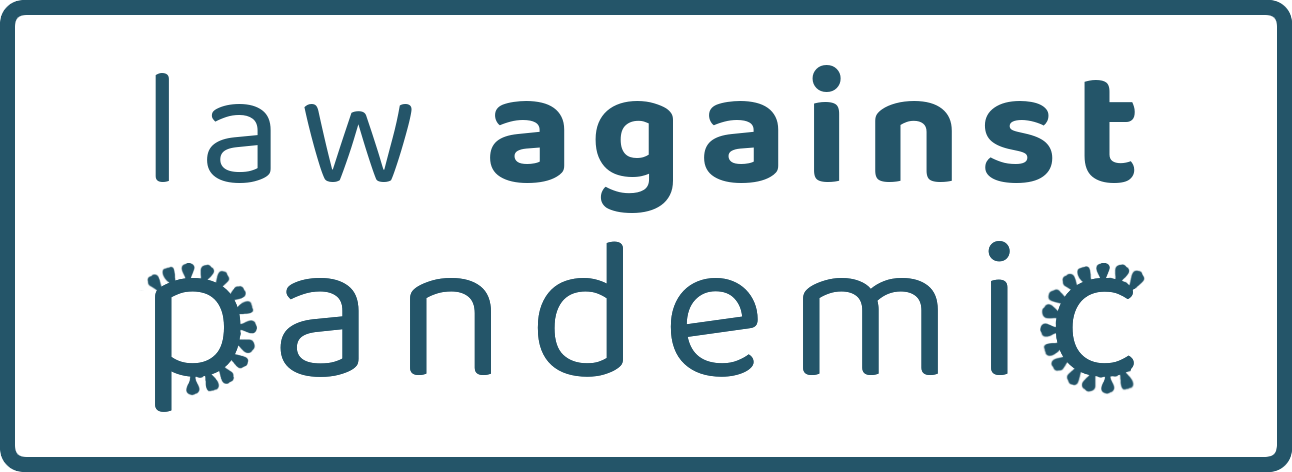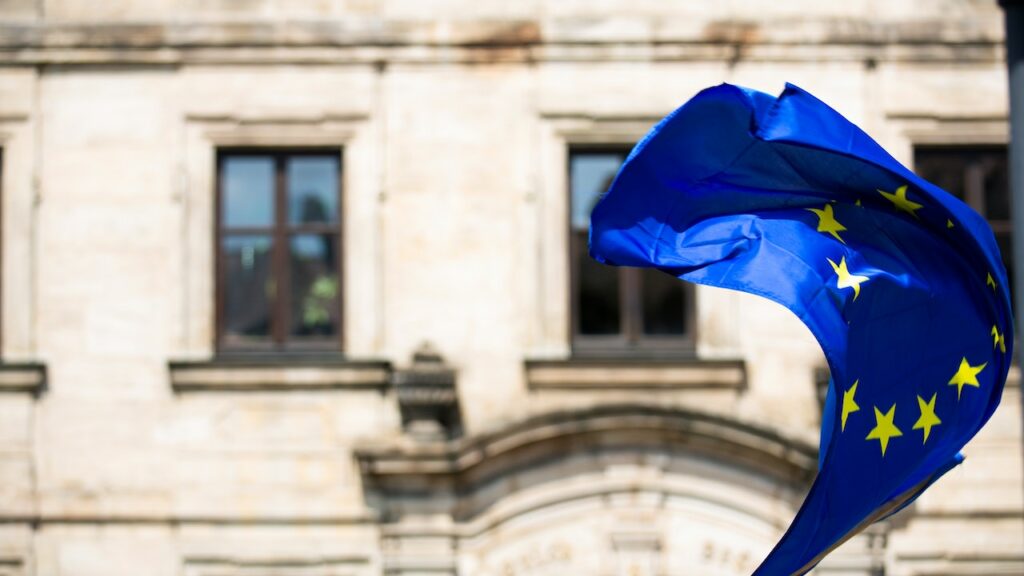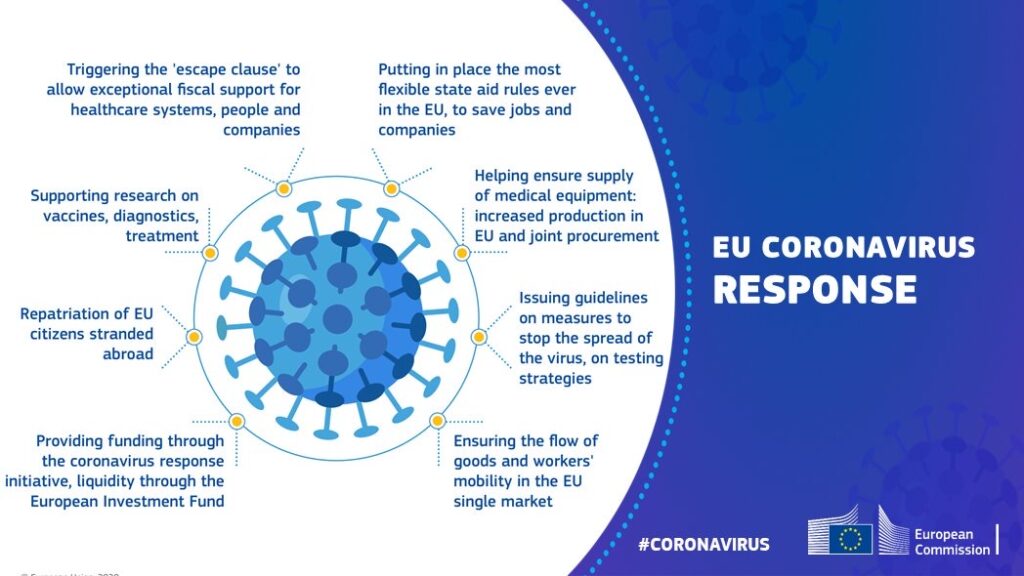The Coronavirus pandemic (COVID-19) requires a global response. It is the first time in our age to face such situation. More than 4,2 million people have been infected so far and about 280 thousand have died. On 10 May 2020, the EU and the UK had already reported 1 239 428 cases and 146 700 deaths.
European Union (EU) as an international body has taken action to fight the spread of the virus, but is has received criticism that it is not doing enough. It is the first time in history of the EU, that it has to handle a global pandemic. The former European Central Bank president Mario Draghi compared the impact of COVID-19 to that of World War I.
To assess European Union’s response in tackling the pandemic one has to investigate its actions.
Graphic: Overview of the Commission’s response, https://ec.europa.eu/info/live-work-travel-eu/health/coronavirus-response/overview-commissions-response_en
European Union is limited by the binding laws and may not go beyond the powers conferred to it by the Member States. However, it is also authorized to start many initiatives.
Under the European Union subsidiarily principle, the EU can’t impose health management policy or action. For example, it can not implement quarantine measures on member states. However, it can play a coordinating role – and it does.
The European Union’s actions on Coronavirus have been organized into three pillars. The first one covers the medical field: prevention; procurement; relief measures and foresight. The second pillar refers to mobility, and the third one is about the economy.
From the very beginning of the outbreak, the EU has insisted that the actions of EU member states need to correspond with the common values of the European Union: freedom, democracy, rule of law and respect for human rights. However, one of the biggest achievements of EU, namely freedom of movement, became the first one to be abandoned in this pandemic. The crossing of borders was argued to be one of the most common ways for the virus to spread. This measure could be considered to be very questionable, because this restriction ruined the feeling of unity that took so long to build.
At the beginning of April 2020, the Commission proposed a new instrument called SURE – Support Mitigating Unemployment Risks in Emergency, in order to mitigate the unemployment risks that have appeared during the Coronavirus outbreak. SURE provided 100 billion Euro to Member States in form of loans on favorable terms. Its goal is to help Member States protect employees against unemployment and therefore loss of income. The reason for the existence of this body is to demonstrate Union solidarity through making possible special financial resources. EU came up with the idea of redirection of all current structural funds in order to accumulate all powers to fight with the coronavirus outbreak.
European Commission and the European Investment Fund unlocked 8 billion Euro by transferring the funds from the European Fund for Strategic Investments. Many businesses such as start-ups, entrepreneurs, micro companies, enterprises and even larger ones will be able to directly apply for support at their local banks and lenders which are participating in the scheme. The EU will provide financing through business loans, micro-finance, guarantees and venture capital. However, the conditions are determined according to internal policy of these financial institutions – there is a lack of unity.
A key focus of the EU during the pandemic is to provide health workers with medical devices and protective equipment, free from any obstacles. The Commission decided to get rid of custom duties and VAT on the import of medical devices and protective equipment from third countries for some period of time, which makes the import nearly one third cheaper.
EU Medical Corps, are a special team that takes care of fast assistance and public health expertise in all EU Member States and other Participating States which is coordinated by the Emergency Response Coordination Centre. It sends doctors and nurses from member states to help the Italians and provide medical disinfectants to places in need. Also, a program called European Union’s Copernicus Satellite System was activated in Italy, in order to control the situation there and support health facilities.
Furthermore, the EU decided to support the public health systems in partner countries outside the Union and allocating 16.6 billion Euro to assisting these partner countries. Moreover, the commission offered 3 million Euro as an assistance package to the partner countries to help to avoid the economic fallout of the worldwide coronavirus crisis. The EU wants to propose a special strategy called „Team Europe” to support partner countries in this field. At the same time The Commission produced guidelines to prevent shortages, allocate medicines etc.
The European Commission activated the EU’s Emergency Support Instrument that is using 2.7 billion Euro to support the development of medication, tests and production of protective gear. Another Instrument used by EU is RescEU medical stockpile, that receives 300 million Euro in addition to initially proposed 80 million Euro that helps to distribute medical equipment to EU member states. It also enables individuals, member states and other institutions to make donations. A similar Agency that operates in Poland, is called the Material Reserves Agency. Its aim is to manage reserves of materials, medicinal products and medical devices.
Additionally, the EU supported the establishment of voluntary contact tracing systems. European Commission put forward a toolbox and guidelines concerning the respect of privacy of EU member states’ citizens. According to them proximity apps can only be used with the permission of the tracked person and can only supply non-personal aggregated data to epidemiological public health bodies.
The European Commission supports the research which helps to develop knowledge about coronavirus. For instance, they established EU COVID-19 Data Platform that is collecting and sharing data about Coronavirus, such as its DNA sequences, protein structures, data from pre-clinical research and clinical trials, as well as epidemiological data. This data has been shared to enable all of the interested people to work on it and advance their research efforts. The platform is an important part in the building of Europe’s Open Science Cloud. Researchers will be able to store, share and analyze a wide variety of findings on coronavirus, from genomic data to microscopy and clinical data.
On 17 March 2020, the European Commission gathered a special group of experts (epidemiologists and virologists) from some Member States. Their task is to formulate the EU response guidelines and manage the risk . This panel was created according to Member States mandates. It’s chair is Commission President, Ursula von der Leyen and Stella Kyriakides, Commissioner for Health and Food Safety.
Thanks to such initiatives, the European Centre for Disease Prevention and Control, and the COVID-19 advisory panel, the first recommendations for community testing measures were published on Health Systems Resilience on 30 March 2020. The Commission appointed special Crisis Coordination Committee, chaired by Commissioner Janez Lenarčič. The main role of the Commission is to support all of the member states and provide them with policy recommendations regarding the virus. What seems to be important is the unity in action in order to avoid chaos and contradictory steps taken by the countries. The most important areas of action are public health, transport, international trade and border control.
Overall, the EU collected over 3 trillion Euro which is the largest monetary response to the crisis. However, according to Ursula von den Layen, much more is needed.
On 4 May 2020, the European Union joined forces with other partners from across the world, such as Saudi Arabia, in order to reach the target of 7.5 billion Euro in initial funding. The Commission registered 7.4 billion Euro in pledges from donors from across the world, during the Coronavirus Global Response pledging event. The funds will be used to help develop an effective diagnostics, treatments and a vaccine which will be universally available and affordable.
The European Union is trying its best to go through the crisis all together, and show that the member countries are extending helping hands to each other. As one can see health and safety have become a top priority, but the EU is also trying to mitigate the socio-economic impact of the coronavirus outbreak. The effectiveness of the EU’s actions can probably be seen only after some period of time and this information will hopefully help EU to be better organized in future crises.
Bibliography:
1. ‘European Commission’s coronavirus response team’ (European Commission Website) https://ec.europa.eu/info/live-work-travel-eu/health/coronavirus-response/european-commissions-action-coronavirus_en accessed 9 May 2020.
2. ‘Overview of the Commission’s response’ (Europaeu) https://ec.europa.eu/info/live-work-travel-eu/health/coronavirus-response/overview-commissions-response_en accessed 5 May 2020.
3. ‘Commission and European Investment Fund unlock €8 billion in finance for 100,000 SMEs’ (European Cluster Collaboration Platform) https://www.clustercollaboration.eu/news/commission-and-european-investment-fund-unlock-eu8-billion-finance-100000 accessed 1 May 2020.
4. ‘Timeline of EU action’ (Eceuropaeu, 10.05.2020) https://ec.europa.eu/info/live-work-travel-eu/health/coronavirus-response/timeline-eu-action_en accessed 10 May 2020.
5. Tidey, Alice (21 January 2020). ‘Coronavirus: How is the EU preparing for an outbreak, and why screening may be futile’. Euronews accessed 24 April 2020.
6. ‘COVID-19: Komisja gromadzi pierwsze w historii zapasy środków medycznych w ramach rescEU’ (Eceuropaeu, 19 marca 2020) https://ec.europa.eu/commission/presscorner/detail/pl/ip_20_476 accessed 9 May 2020.
7. Pankowska Maria, ‘Szumowski krytykuje UE: „Nie ma tej europejskiej solidarności” To wielopiętrowy fałsz’ (Okopress, 26.03.202) https://oko.press/szumowski-krytykuje-ue-nie-ma-tej-europejskiej-solidarnosci-to-wielopietrowy-falsz/ accessed 9 May 2020
8. ‘What are ”corona bonds” and how can they help revive the EU’s economy?’ (Euronews, 26.03.2020) https://www.euronews.com/2020/03/26/what-are-corona-bonds-and-how-can-they-help-revive-the-eu-s-economy accessed 2 May 2020.




